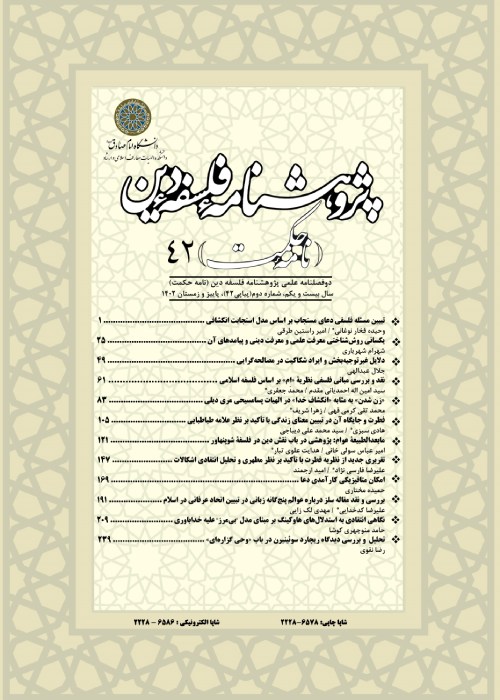Frege, Wittgenstein and Private Language Argument
Author(s):
Abstract:
One of the most controversial topics which is discussed by Wittgenstein in Philosophical Investigations is private language argument. According to Wittgenstein, the way in which a language-user categorizes his thoughts, feelings and emotions in the language cannot be talked about personally and privately. Words and Sentences do not gain their meaning in private. Wittgenstein’s argument is based on “correct /seems to be correct” distinction. According to him, if the language-user is authorized to utilize words and sentences privately, the mentioned distinction would be irrelevant and non-sense, normatively speaking. In other words, in such a situation we cannot give an account of the calibration of word use in different contexts. It follows from this that the whole idea of meaning is evaporated. Furthermore, Frege argued in favoure of the objectivity of meaning in his famous article entitled Thought. According to him, the distinction between idea and thought should be taken into account in order to discuss the very idea of ‘meaning’. Idea is entirely private, subjective and associated with mental image, whereas thought is public, objective and associated with meaning. In other words, mental image does not have any role in the formation of meaning, semantically speaking. Frege appealed to Platonic realm in order to give an account of how ideas and meanings can be distinguished from each other, metaphysically speaking. It is said that Wittgenstein is influenced by Fregean account of meaning in formulating his private language argument, although he does not subscribe to Frege’s Platonic ontology.In this article, we are going to give an account of how Fregean account of meaning is utilized in Wittgenstein’s private language argument. Firstly, we formulate and give an account of private language argument in the Wittgensteinian sense. We formulate our argument based on the rule-following argument which has a key role in understanding private language argument. To do so, we try to criticise the anti-realistic account of meaning and justify the realistic account of meaning, according to which the language-user is answerable to patterns of word use. In this way, we can give an account of 'correct /seems to be correct' distinction, semantically speaking. Secondly, we read the private language argument in the light of the realistic account of meaning. Thirdly, Frege’s account of meaning is discussed in details. Finally, Wittgenstein’s private language argument is compared with Fregean account of meaning.
Language:
Persian
Published:
Philosophy Of Religion Research, Volume:4 Issue: 1, 2008
Page:
57
magiran.com/p468458
دانلود و مطالعه متن این مقاله با یکی از روشهای زیر امکان پذیر است:
اشتراک شخصی
با عضویت و پرداخت آنلاین حق اشتراک یکساله به مبلغ 1,390,000ريال میتوانید 70 عنوان مطلب دانلود کنید!
اشتراک سازمانی
به کتابخانه دانشگاه یا محل کار خود پیشنهاد کنید تا اشتراک سازمانی این پایگاه را برای دسترسی نامحدود همه کاربران به متن مطالب تهیه نمایند!
توجه!
- حق عضویت دریافتی صرف حمایت از نشریات عضو و نگهداری، تکمیل و توسعه مگیران میشود.
- پرداخت حق اشتراک و دانلود مقالات اجازه بازنشر آن در سایر رسانههای چاپی و دیجیتال را به کاربر نمیدهد.
In order to view content subscription is required
Personal subscription
Subscribe magiran.com for 70 € euros via PayPal and download 70 articles during a year.
Organization subscription
Please contact us to subscribe your university or library for unlimited access!


